
The Search for the First Americans
Science, Power, Politics
Seiten
2021
University of Oklahoma Press (Verlag)
978-0-8061-7591-1 (ISBN)
University of Oklahoma Press (Verlag)
978-0-8061-7591-1 (ISBN)
Who were the First Americans? Where did they come from? When did they get here? Are they the ancestors of modern Native Americans? The practice of science in its search for the First Americans is a flawed endeavor, Robert Davis tells us. His book is an effort to explain why.
Who were the First Americans? Where did they come from? When did they get here? Are they the ancestors of modern Native Americans? These questions might seem straightforward, but scientists in competing fields have failed to convince one another with their theories and evidence, much less Native American peoples. The practice of science in its search for the First Americans is a flawed endeavor, Robert V. Davis tells us. His book is an effort to explain why.
Most American history textbooks today teach that the First Americans migrated to North America on foot from East Asia over a land bridge during the last ice age, 12,000 to 13,000 years ago. In fact, that theory hardly represents the scientific consensus, and it has never won many Native adherents. In many ways, attempts to identify the first Americans embody the conflicts in American society between accepting the practical usefulness of science and honoring cultural values. Davis explores how the contested definition of “First Americans” reflects the unsettled status of Native traditional knowledge, scientific theories, research methodologies, and public policy as they vie with one another for legitimacy in modern America. In this light he considers the traditional beliefs of Native Americans about their origins; the struggle for primacy-or even recognition as science-between the disciplines of anthropology and archaeology; and the mediating, interacting, and sometimes opposing influences of external authorities such as government agencies, universities, museums, and the press.
Fossil remains from Mesa Verde, Clovis, and other sites testify to the presence of First Americans. What remains unsettled, as The Search for the First Americans makes clear, is not only who these people were, where they came from, and when, but also the very nature and practice of the science searching for answers.
Who were the First Americans? Where did they come from? When did they get here? Are they the ancestors of modern Native Americans? These questions might seem straightforward, but scientists in competing fields have failed to convince one another with their theories and evidence, much less Native American peoples. The practice of science in its search for the First Americans is a flawed endeavor, Robert V. Davis tells us. His book is an effort to explain why.
Most American history textbooks today teach that the First Americans migrated to North America on foot from East Asia over a land bridge during the last ice age, 12,000 to 13,000 years ago. In fact, that theory hardly represents the scientific consensus, and it has never won many Native adherents. In many ways, attempts to identify the first Americans embody the conflicts in American society between accepting the practical usefulness of science and honoring cultural values. Davis explores how the contested definition of “First Americans” reflects the unsettled status of Native traditional knowledge, scientific theories, research methodologies, and public policy as they vie with one another for legitimacy in modern America. In this light he considers the traditional beliefs of Native Americans about their origins; the struggle for primacy-or even recognition as science-between the disciplines of anthropology and archaeology; and the mediating, interacting, and sometimes opposing influences of external authorities such as government agencies, universities, museums, and the press.
Fossil remains from Mesa Verde, Clovis, and other sites testify to the presence of First Americans. What remains unsettled, as The Search for the First Americans makes clear, is not only who these people were, where they came from, and when, but also the very nature and practice of the science searching for answers.
Robert V. Davis Jr. holds a PhD in science and technology studies from Virginia Tech University. Since his retirement from public service with the federal government, he has focused his research and writing on the interactions between science and public policy.
| Erscheinungsdatum | 26.11.2021 |
|---|---|
| Verlagsort | Oklahoma |
| Sprache | englisch |
| Maße | 152 x 229 mm |
| Gewicht | 462 g |
| Themenwelt | Geisteswissenschaften ► Archäologie |
| Geisteswissenschaften ► Geschichte ► Regional- / Ländergeschichte | |
| Sozialwissenschaften ► Ethnologie | |
| Sozialwissenschaften ► Soziologie | |
| ISBN-10 | 0-8061-7591-5 / 0806175915 |
| ISBN-13 | 978-0-8061-7591-1 / 9780806175911 |
| Zustand | Neuware |
| Informationen gemäß Produktsicherheitsverordnung (GPSR) | |
| Haben Sie eine Frage zum Produkt? |
Mehr entdecken
aus dem Bereich
aus dem Bereich


